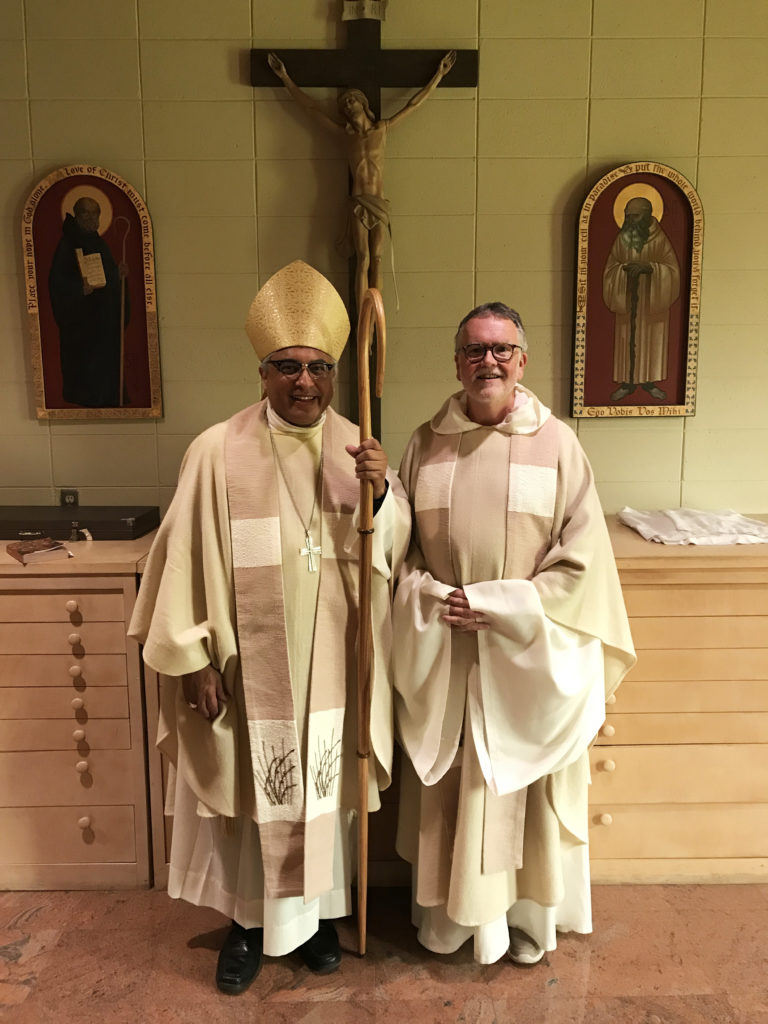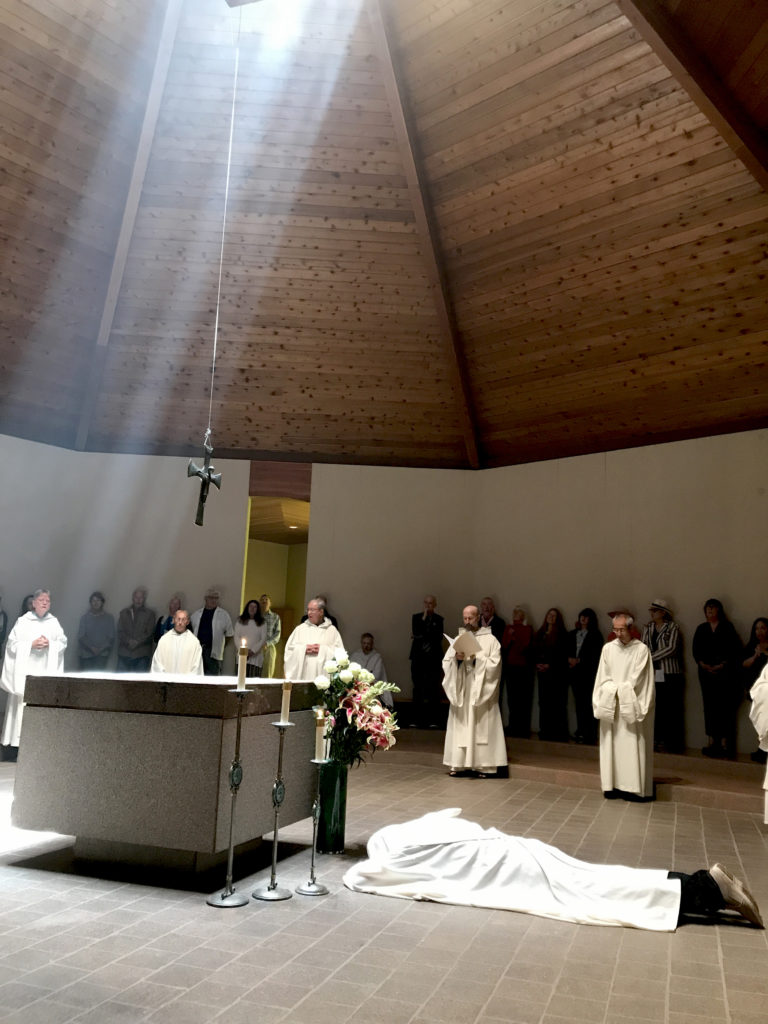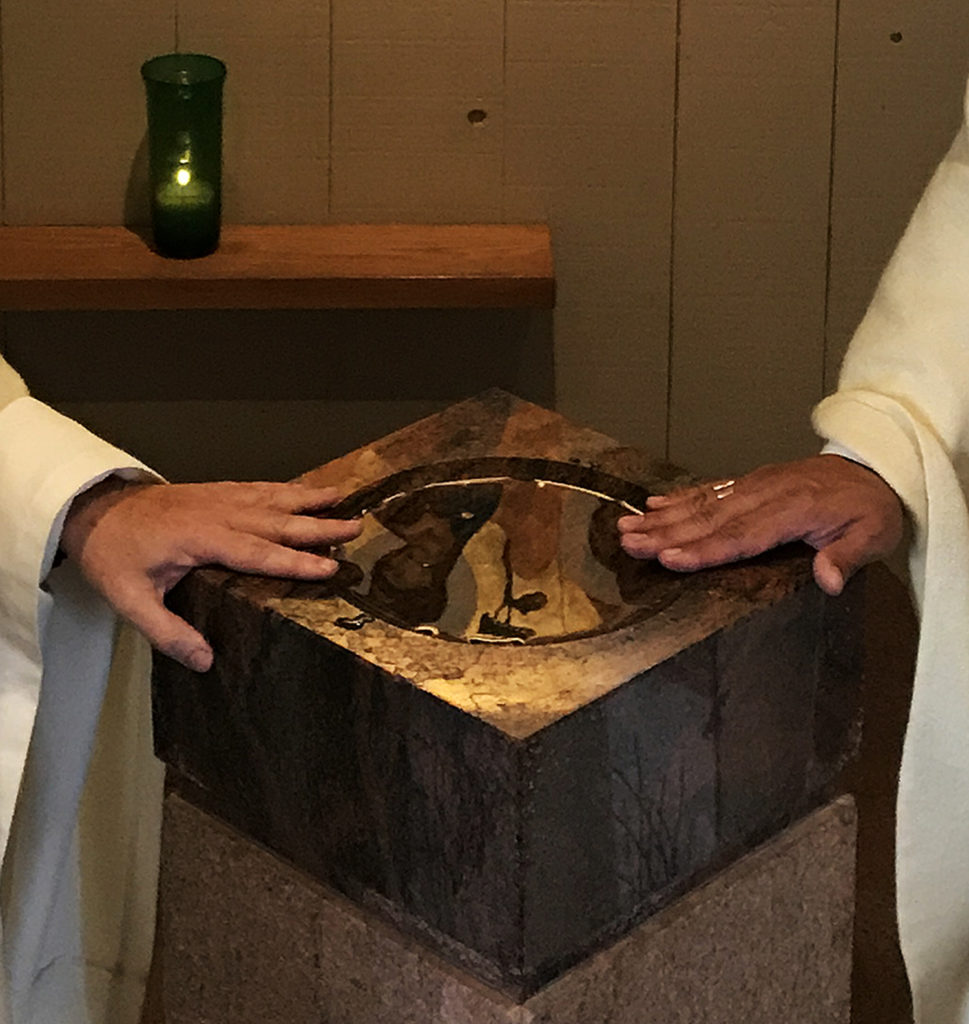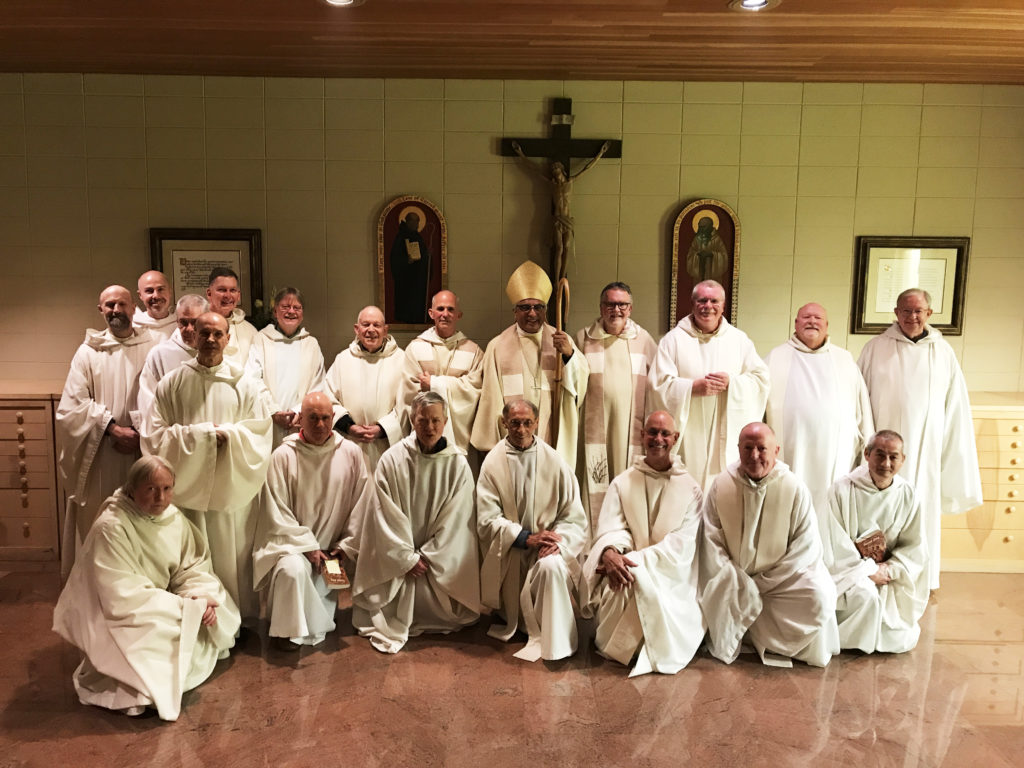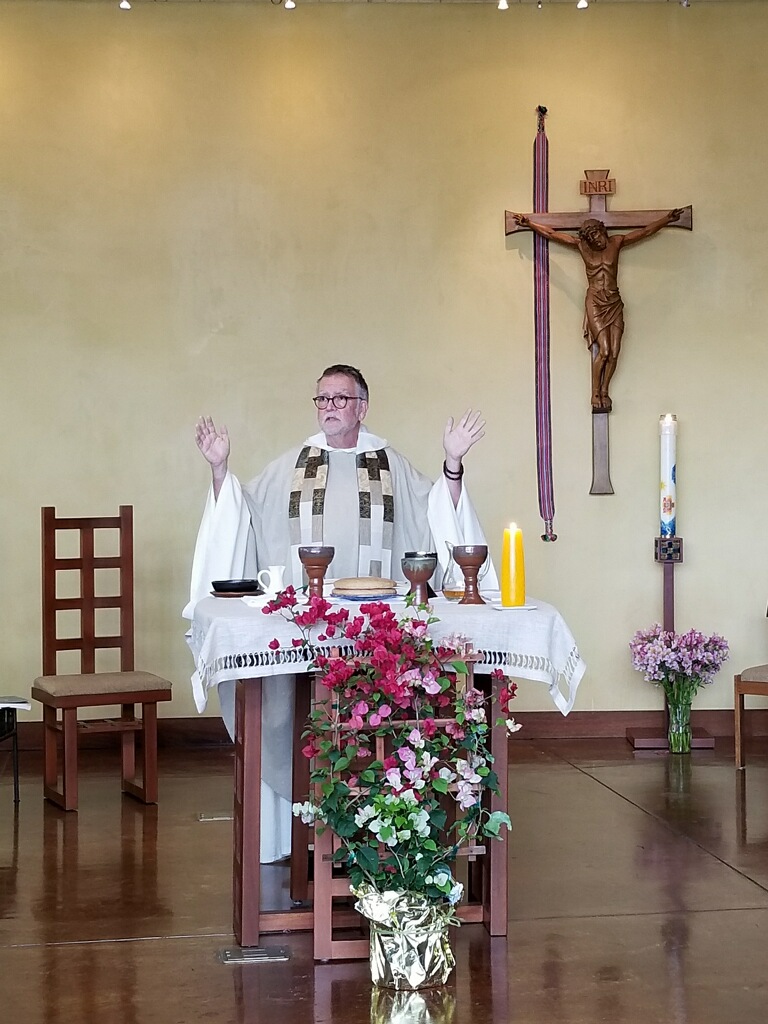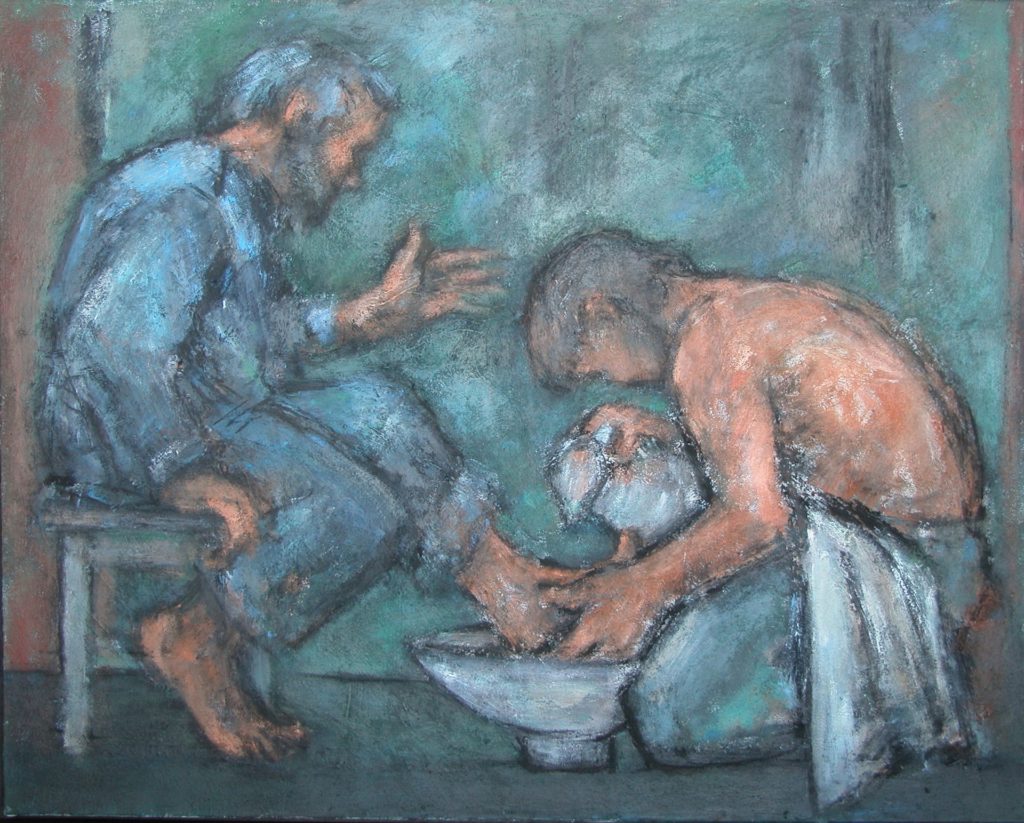(Cyprian’s homily for the Mass of Thanksgiving begins much as his May 30 homily but is expanded)
I was walking from my cell to the chapel one day along our row, and I ran into Brother Joshua just getting into his golf cart and, as happens from time to time, I hopped in for a ride. I knew he was looking forward to celebrating Bede’s ordination, and so I asked him, “Are you getting excited about the ordination next week?” And he said, “Oh, Bede’s already been a priest for years!” I was kind of taken aback by that, and I said, “What? What do you mean?” And he said, “Well, people always think he’s already a priest, and they keep asking, ‘Why doesn’t he just get ordained?’” And I said, “Joshua, you just summed up the theme of my homily, much more succinctly than I’m going to! May I quote you on that?” He hesitated for a moment, and then replied, “Yes. Yes, you may.”
Not to diminish at all the grace conferred by the Sacraments themselves, I have had this notion for some time that the Sacraments don’t only bestow grace and don’t just confer power; at times the Sacraments actually recognize something that’s already there, or perhaps, as in the case of Holy Orders, recognize and authorize something that’s already there incipiently. And specifically in the case of ministerial priesthood, it is actually an extension and continuation of the priesthood of Jesus Christ conferred on all of us at our Baptism. We are, as Saint Peter wrote, a priestly people; we are all, or at least meant to be, prophets, priests, and royalty under the banner of Christ.
We have the opposite phenomenon all too often, of being baptized and yet never converted, for instance. This is why there is a somewhat valid though controversial argument for delaying Baptism until the one to be baptized can make the choice; and why we were holding off on the Sacrament of Confirmation until at least high school in many dioceses––something that has been pushed back to being administered with First Communion in more and more places now––so that the young person could actually make an adult choice for Christian discipleship instead of thinking of the Sacrament as if it were a magic formula. And even Communion itself: it not only brings about union with God and the community; the Church also very clearly proclaims that Eucharist is also a sign of a unity that is already there, union with the teachings of the Church and a union with those with whom we are gathered; why we say the Lord’s Prayer and give the sign of peace before we dare to approach the Table.
Even the Sacrament of Reconciliation: there has to be sincere repentance walking into the confessional in order to be receptive to the ever-present mercy of God, hence the Act of Contrition and even a penance to solidify the repentance. One last example, marriage: it cannot simply be an abstract conferral of a bond between two random strangers. It has got to be a sign of a love that is already there, a marriage of two souls that has already begun to take place, and the gathered assembly stands as a witness to that love, and stands to call the couple back to that bond when times get rough. Hence the long preparation that the Church calls for…(i)
This does not work out in every case, but I believe it especially applies to the Sacrament of Holy Orders. That’s why the discernment is not done only between the individual candidate and God; the discernment is done by the church who calls someone to ministry, by a community who calls someone to spiritual leadership, because in some way they already recognize a kind of priesthood––gifts for ministry, a desire and capacity for service, an ability to break open the Word in teaching and preaching, and that other certain je ne sais quoi quality of being a bridge in one’s own person, bringing God to people and people to God, in our case, through Jesus, and now through the Sacraments of the Church.
This is certainly true in the case of Bede, whose care for souls has stretched back decades in his work as a therapist; who has abundantly shown his love and capacity for teaching and preaching; who has been available to serve his community in a myriad of ministries. As Joshua said, in some way he has already been a priest for years.
Monastic priesthood is the opposite of the clericalism that we hear about so much, even a kind of antidote to it. If a vocation candidate comes to the monastery and talks constantly about being a priest, we send him away and urge him to go to the seminary. If he wants to be a monk, on the other hand, then we have something to talk about. They are two very different vocations––monk and priest, though they can go together, and the two got so intertwined in the Middle Ages so as to seem inseparable.
There was a very healthy movement in modern times to make sure we realize that they are two very different vocations. And Bede is of that generation, highly educated, highly competent, but insistently a monk with no need for his own self-esteem to be raised into the ranks of the hierarchy, even though constantly being called into leadership in his monastic communities. How many times I have painstakingly explained to people, “We are all equal monks but the community calls some of the brothers to be ordained to the priesthood as well, in our case mainly to serve our own pastoral needs.” (Besides that, the Church insists still that only ordained men can serve in positions of leadership, something we have petitioned to change several times, so at this point in history there is still a necessity of ordaining some men.) But many cultures––oftentimes our own!––just don’t understand any vocation outside of being a priest, and wonder why every monk doesn’t go on to it. Whereas from its origin monasticism is a lay movement. St. Benedict himself seemed hesitant about even accepting priests into the monastery, and made darn sure that they knew they got no special rank for it.
There’s one story about a priest visiting the monastery and mistakenly asking one of the brothers, “Are you a priest or just a brother?” To which the quick-witted brother responded, “And you: are you a monk––or just a priest?”
So much for my caveat. That being said, in our own tradition we do call some of our monks forward to serve in the ministerial priesthood––to teach, to serve, to sanctify. And it is not just because somebody wants to be ordained. I know of several monks who wanted ardently to be ordained but were not called. What I respect about that is the concrete recognition that the call is not just about me “wanting to be a priest.”
Bede told me that the scripture passage from the Gospel of John––‘It was not you who chose me; it was I who chose you’ (ii)––has meant to him since the beginning of his vocation. It is we who recognized in our Brother Bede the qualities of priestly ministry, a desire and capacity for service, an ability to break open the Word in teaching and preaching, and the quality of being a bridge in his own person––bringing God to people and people to God through Jesus. Recognizing this priesthood, that’s why we asked the bishop to confer on him Holy Orders and authorize him to serve as a presbyter for our community and the greater Body of Christ, in a world so in need of true servants.
I can’t think of a worse time, in my lifetime, to be a priest.(iii) Its social status has diminished just as its panache has grown irksome. Just this month an article splashed on the cover of the Atlantic magazine by a popular writer and former priest––“ Abolish the Priesthood to Save the Church.” I can’t think of a worse time to be ordained a priest. That being said, there also couldn’t be a better time to be an ordained priest; there has never been a time when the church and the world, especially the suffering, have had greater need of a healing touch, an evangelizing word, good news to the poor. Bede has certainly put this face of the priesthood forward, in his invitation with the image of foot washing and the card saying “Called to Service… for the Tomorrow of God.”
To tie all this in with the Feast of the Ascension: besides the fact that Jesus commissions his disciples before he ascends, I have always loved this question that the two dressed in white garments ask them at the end: ‘Why are you looking at the sky?’(iv) It reminds me of Peter wanting to build three tents on Mount Tabor after the Transfiguration: “Let’s stay here.” And Jesus says, “No, we have to go back down the mountain, Peter,” and the first thing he does is heal someone.
There is a phrase that our Prior General Alessandro used at our last General Chapter that Bede picked up on––“The tomorrow of God.” Called to service… for the tomorrow of God. Why are you looking in the sky? Why are you worried about heaven? Jesus will come back and heaven will take care of itself and it shall all be yours in due time. But until then, and for now––was it not Jesus’ prayer, Thy kingdom come, thy will be done on earth as it is in heaven? Your job, our job, our hope, our mission is the tomorrow of God. And that Bede would accept this ministry, at this time in his life and in the life of the church and in the history of the Camaldolese presence in America is a sign of hope for the tomorrow of God.
Fr. Cyprian, Prior, NCH, 2 June 2019
i To some extent this is the ancient debate between ex opera operato and ex opera operantis: is grace conferred from the administration of the sacrament––from “the work worked”? Of course! But is something not also conferred from “the working of the work,” from doing the sacrament? Of course we believe that the Spirit works even on an unreceptive candidate, just as the Spirit can work through an unworthy minister (thanks be to God!). But we never disregard our own preparation for a sacrament and our capacity to receive the grace that is being bestowed.


